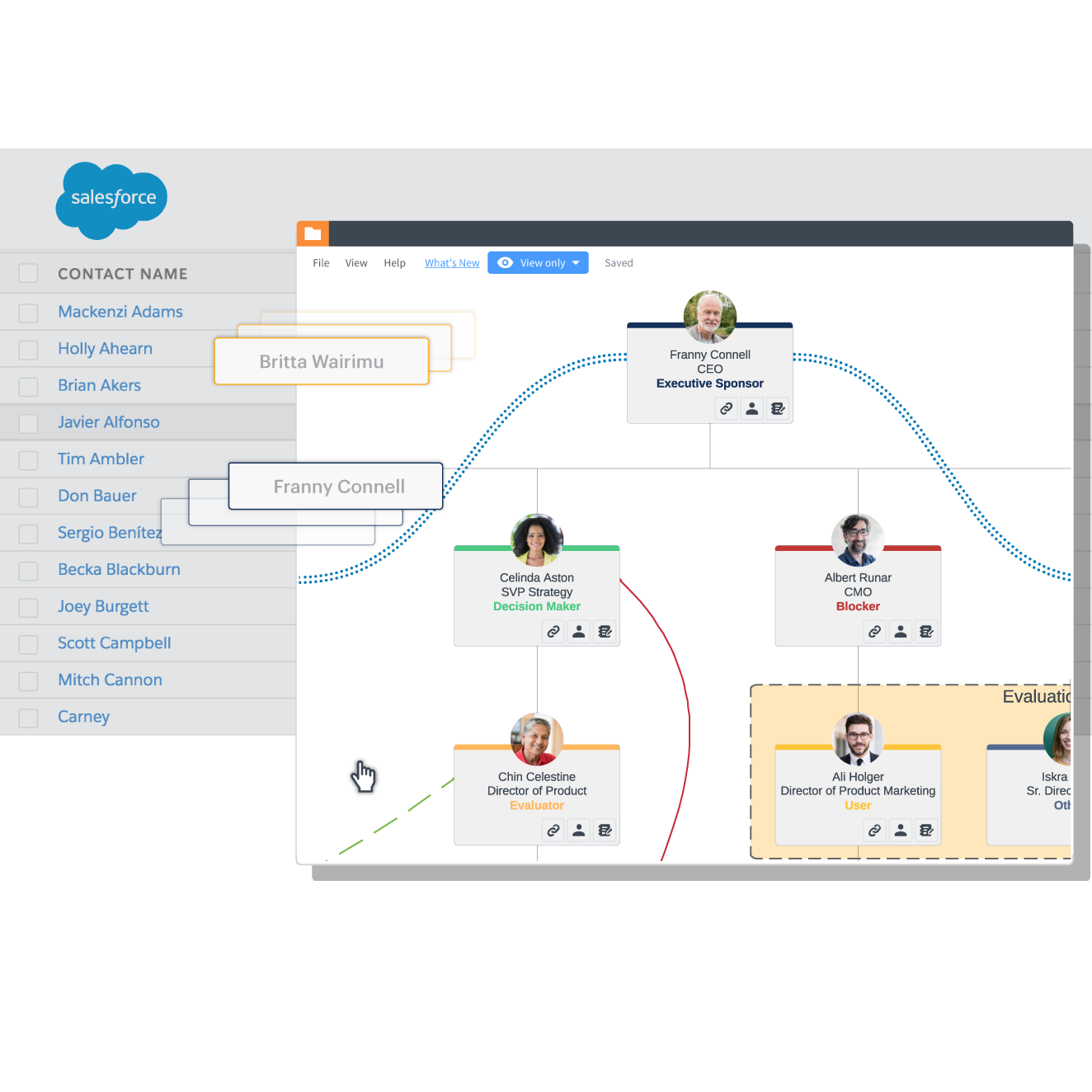
5 steps to creating a data-driven sales organization
Lucid Content
Reading time: about 6 min
Topics:
In business, the more informed the decision-making, the better. Modern sales teams are increasingly looking to data and data analysis to inform their decision-making and improve sales performance. Let’s take a look at how you can build your own data-driven sales organization.
What is a data-driven sales organization?
Data-driven is more than a modern buzzword. According to SalesLoft, “companies who regard themselves as ‘data-driven’ are both more profitable and more productive.” Data-driven companies are reporting higher conversion rates, more accurate forecasting, and overall better sales performance.
Being data-driven means basing your strategy on measurable, quantifiable data rather than on more outdated or traditional sales practices like simple referrals, product demonstrations, and intuition. Especially when selling to other businesses, the right amount, variety, and type of data can mean the difference between meeting sales goals and exceeding sales goals. Armed with critical information to forecast trends and take massive action, a data-driven sales team can disrupt an entire industry.
It’s important to note the distinction between a data-driven team and simply a data-informed team. Many companies report that the biggest obstacle in their data analysis is the formation of data silos where information remains within a given department and is rarely shared or accessed laterally. A data-informed team will have access to valuable information but may suffer from the data silos that prevent them from being able to draw any notable insights from the data they do collect.
Data-driven teams, on the other hand, eliminate silos by placing data collection and sharing at the core of their ethos. Numbers don’t lie, and data-driven teams share those numbers throughout the organization to create the best strategy.
Common data-driven sales challenges
Building a data-driven sales organization comes with its own set of challenges. For example, salespeople are typically outgoing, relationship-minded extroverts. While those personality types are excellent salespeople, they might not be data-minded. In fact, the founding CEO of Datameer, Stephen Groschupf argues that “sales teams by nature (…) are almost data averse.”
It's important to lean into the strengths and skill sets of charismatic sales personalities. Rather than bogging them down with manual, data-driven tasks, empower them with a data-driven strategy built to help them capitalize on their strengths and make smart, data-driven sales decisions.
How to implement a data-driven strategy
Being aware of this challenge is the first step. Here’s a look at the additional steps you need to take to build a high-performance data-driven sales organization.
1. Foster a numbers-driven culture
Data without application is moot. Fostering a numbers-driven culture begins with people in leadership committing to applying all relevant data toward action. This action then has to trickle down into the daily practices of all sales team members.
Data analysis and insight must become part of the thoughts, attitudes, beliefs, and behaviors of the members of your sales team. This shift in thinking could include anything from a daily data research challenge to workshops and training on how to collect better data to simply listening to what data your team is harvesting every day.
The goal is to get the entire team in the habit of discussing, applying, and acting on data. Think of it like a new office language. Consulting firm McKinsey says, “To make analytics part of the fabric of daily operations, managers must view it as central to solving problems and identifying opportunities.”
2. Invest in value-adding tech tools
A data-driven sales team cannot function without the right sales tech stack, and your data is only as valuable as the insights you draw from it. Investing in the right tech will ensure that you’re able to form meaningful conclusions from the data you’re collecting, from visualizing trends to analyzing sales rep activity.
Focus on automation. Tech tools that automate sales processes and have predictive behavior will give your sales team more time to focus on their strengths and invest in vital relationship-building.
There are a variety of tools to choose from, with sales enablement firm Seismic sharing that sales enablement tool spending has increased a whopping 69% since 2014, as more sales leaders understand the return on investment on the right sales tech tool. A good place to start is with Lucidchart, whose diagramming software gives sales leaders the ability to build out sales dashboards and even overlay data on top of your processes to assess their performance.
3. Establish company-wide goals
Alignment on your goals is critical to the success of your data-driven team. And alignment begins with clear and open communication. First, get everyone on board with your new goals. Be clear about what the goals are, how you arrived at these specific goals, and what you hope to achieve through them (i.e., greater revenue, larger market share, branching into a new market, etc.).
Next, confirm with everyone responsible for ownership of the data. Is your organization small enough to have each sales team member responsible for data delivery, or is it better to assign a team leader to supervise that task? Alternatively, if you’re part of a larger organization, consider building a cross-departmental team to manage, analyze, and implement data findings.
4. Provide ongoing coaching
Sales coaching has a marked effect on performance in organizations of every size. As you create your data-driven sales team, keep your team up to speed by using data throughout the training and coaching process. For example, have reps analyze current conversion rates at different stages in the sale funnel. Data-driven training will allow you to train team members faster and more effectively.
Looking for a place to start with your data-driven sales coaching? With Lucidchart, sales reps can build account maps that provide a full understanding of a deal and its progression, so sales leadership can offer personalized feedback and training.
5. Make decisions driven by data
At this point, you’ve collected the data, you’ve invested in tools to support it, you’ve set some goals, and you’ve trained your reps. Decision-making time is where data earns its salt. If leveraged correctly, the data-driven insights you’ve drawn from team members and tech tools can scale your sales process by giving you repeatable and refinable strategies.
For example, if your data feedback is showing you that leads who watch a certain piece of content are more likely to convert, your team can decide to insert that piece of content into all outgoing sales outreach.
Think of it like the scientific method: Establishing your company-wide goals is like forming a hypothesis, training your team and implementing your strategy is like conducting your experiment, and making data-driven decisions is like drawing your conclusions and publishing your work.
As more companies continue to adopt a data-driven strategy in their sales processes, more sophisticated tools and tactics will become available. For now, though, the combination of thoughtful execution, data-backed conclusions, and support tech tools is a proven way to significantly expand sales.

See how Lucidchart helps you take action on your data with dynamic account maps and key integrations with popular sales tools.
Learn moreAbout Lucidchart
Lucidchart, a cloud-based intelligent diagramming application, is a core component of Lucid Software's Visual Collaboration Suite. This intuitive, cloud-based solution empowers teams to collaborate in real-time to build flowcharts, mockups, UML diagrams, customer journey maps, and more. Lucidchart propels teams forward to build the future faster. Lucid is proud to serve top businesses around the world, including customers such as Google, GE, and NBC Universal, and 99% of the Fortune 500. Lucid partners with industry leaders, including Google, Atlassian, and Microsoft. Since its founding, Lucid has received numerous awards for its products, business, and workplace culture. For more information, visit lucidchart.com.
